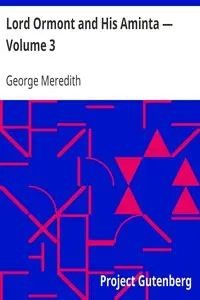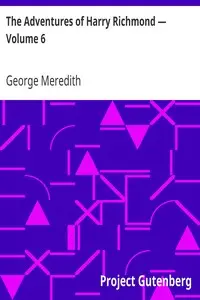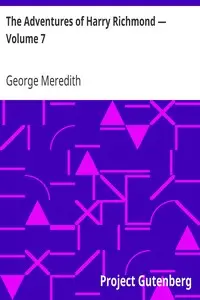"The Amazing Marriage — Volume 3" by George Meredith is a compelling novel set in the late 1800s that uses its characters to reveal the complicated rules of society and relationships during that time. The story circles around love, deceit, and the big differences between rich and poor people, mainly through the story of Gower Woodseer and the countess, Carinthia. The book starts with Gower trying to deliver an important message to the countess who is in trouble because her husband, Lord Fleetwood, left her soon after their wedding. Throughout the beginning, characters like Admiral Baldwin, who is very sick, and Mrs. Carthew, who explains the countess's sad situation, appear and create an intricate web of social interactions. Gower's strong desire to assist the countess, while dealing with his own problems, emphasizes the challenges and hard decisions the characters must struggle against. The characters' drives as well as the views it provides on society makes for an interesting investigation into the problems that individuals face and the effects of their actions.

The Amazing Marriage — Volume 3
By George Meredith
In a world of societal expectations and personal turmoil, a loyal man risks everything to aid a countess abandoned and suffering a broken marriage.
Summary
About the AuthorGeorge Meredith was an English novelist and poet of the Victorian era. At first, his focus was poetry, influenced by John Keats among others, but Meredith gradually established a reputation as a novelist. The Ordeal of Richard Feverel (1859) briefly scandalised Victorian literary circles. Of his later novels, the most enduring is The Egoist (1879), though in his lifetime his greatest success was Diana of the Crossways (1885). His novels were innovative in their attention to characters' psychology, and also portrayed social change. His style, in both poetry and prose, was noted for its syntactic complexity; Oscar Wilde likened it to "chaos illumined by brilliant flashes of lightning". Meredith was an encourager of other novelists, as well as an influence on them; among those to benefit were Robert Louis Stevenson and George Gissing. Meredith was nominated for the Nobel Prize in Literature seven times.
George Meredith was an English novelist and poet of the Victorian era. At first, his focus was poetry, influenced by John Keats among others, but Meredith gradually established a reputation as a novelist. The Ordeal of Richard Feverel (1859) briefly scandalised Victorian literary circles. Of his later novels, the most enduring is The Egoist (1879), though in his lifetime his greatest success was Diana of the Crossways (1885). His novels were innovative in their attention to characters' psychology, and also portrayed social change. His style, in both poetry and prose, was noted for its syntactic complexity; Oscar Wilde likened it to "chaos illumined by brilliant flashes of lightning". Meredith was an encourager of other novelists, as well as an influence on them; among those to benefit were Robert Louis Stevenson and George Gissing. Meredith was nominated for the Nobel Prize in Literature seven times.












